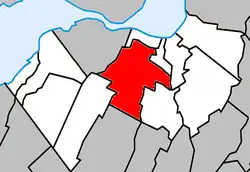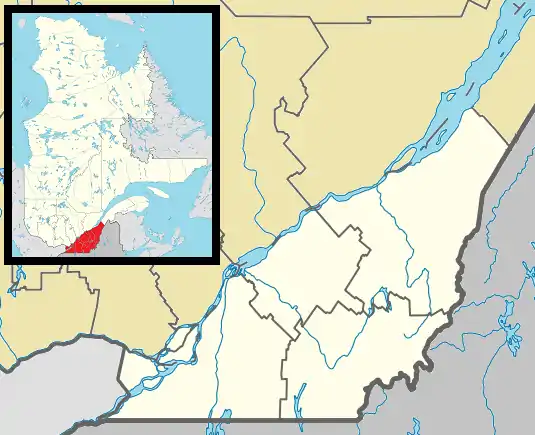Saint-Constant, Quebec
Saint-Constant is a city in southwestern Quebec, Canada. It is located on the south shore of Montreal in the Roussillon Regional County Municipality of the Montérégie region. The population as of the Canada 2016 Census was 27,359.
Saint-Constant | |
|---|---|
 | |
 Location within Roussillon RCM | |
 Saint-Constant Location in southern Quebec | |
| Coordinates: 45°22′N 73°34′W[1] | |
| Country | Canada |
| Province | Quebec |
| Region | Montérégie |
| RCM | Roussillon |
| Constituted | July 1, 1855 |
| Government | |
| • Mayor | Jean-Claude Boyer |
| • Federal riding | La Prairie |
| • Prov. riding | Sanguinet |
| Area | |
| • Total | 57.12 km2 (22.05 sq mi) |
| • Land | 57.06 km2 (22.03 sq mi) |
| Population | |
| • Total | 29,954 |
| • Density | 524.9/km2 (1,359/sq mi) |
| • Pop (2016-21) | |
| • Dwellings | 11,502 |
| Time zone | UTC−5 (EST) |
| • Summer (DST) | UTC−4 (EDT) |
| Postal code(s) | |
| Area code(s) | 450 and 579 |
| Highways | |
| Website | www |
History

Early settlement took place in 1725 as a result of the opening of the St. Pierre concession. The Côte Saint-Pierre mission (first name of the parish) began in 1750 with the construction of a church and two years later, the parish registers opened. Rang Saint-Pierre was the central concession of the Sault-Saint-Louis seigneurie and extended into the seigneurie of LaSalle. In 1815 Rang Saint-Pierre was nicknamed "Black Cattle Road" because it was the way cattle were transported from New York to Montreal. Centrally located in what was then Laprairie County, the village of Saint-Constant was the only location of voting from 1829 to 1841. Residents of the area witnessed or took part in the Lower Canada Rebellion of 1837–1838.
Local administrative structures emerged in Saint-Constant in 1845 with the introduction of the parish municipality and the school board. However, the vast territory of the parish of Saint-Constant was already subdivided for Saint-Rémi (1840), Saint-Édouard (1833), and Saint-Isidore (1833). This trend continued with the establishment of Saint-Michel (1854), Saint-Mathieu (1919) and Sainte-Thérèse-de-Delson (1932). One of the mayors, Solime Cardinal (1815–1897), was the maternal grandfather of Charles-Émile "Charley" Trudeau, a successful French Canadian entrepreneur who became the father of Pierre Elliott Trudeau, 15th Prime Minister of Canada, and grandfather of Justin Trudeau, 23rd and current Prime Minister of Canada.
Saint-Constant was transformed by the construction of the Canadian National Railway and Canadian Pacific Railway in the last quarter of the nineteenth century. The electrification of the village occurred around 1918 and rural electrification was completed in 1939. The Rue Saint-Pierre was extended from Montées des Bouleaux/Rue Sainte-Catherine, in the direction of Route 132 in 1950. Starting in the 1950s, suburban development occurred in Saint-Constant, allowing it to obtain city status in 1973.
Demographics
In the 2021 Census of Population conducted by Statistics Canada, Saint-Constant had a population of 29,954 living in 11,313 of its 11,502 total private dwellings, a change of 9.5% from its 2016 population of 27,359. With a land area of 57.06 km2 (22.03 sq mi), it had a population density of 525.0/km2 (1,359.6/sq mi) in 2021.[4]
| 2021 | 2016 | 2011 | |
|---|---|---|---|
| Population | 29,954 (+9.5% from 2016) | 27,359 (+9.5% from 2011) | 24,980 (+4.3% from 2006) |
| Land area | 57.06 km2 (22.03 sq mi) | 57.13 km2 (22.06 sq mi) | 56.83 km2 (21.94 sq mi) |
| Population density | 524.9/km2 (1,359/sq mi) | 478.9/km2 (1,240/sq mi) | 439.5/km2 (1,138/sq mi) |
| Median age | 40.0 (M: 39.6, F: 40.4) | 38.8 (M: 38.4, F: 39.2) | 38.0 (M: 37.7, F: 38.4) |
| Private dwellings | 11,502 (total) | 10,282 (total) | 9,109 (total) |
| Median household income | $101,000 | $86,604 | $78,274 |
|
|
| |||||||||||||||||||||||||||||||||||||||||||||||||||||||||||||||
| Source: Statistics Canada[10] | |||||||||||||||||||||||||||||||||||||||||||||||||||||||||||||||||
| Canada Census Mother Tongue - Saint-Constant, Quebec[10] | ||||||||||||||||||
|---|---|---|---|---|---|---|---|---|---|---|---|---|---|---|---|---|---|---|
| Census | Total | French |
English |
French & English |
Other | |||||||||||||
| Year | Responses | Count | Trend | Pop % | Count | Trend | Pop % | Count | Trend | Pop % | Count | Trend | Pop % | |||||
2016 |
26,695 |
22,905 | 85.80% | 1,430 | 5.35% | 330 | 1.23% | 2,355 | 8.82% | |||||||||
2011 |
24,705 |
21,685 | 87.78% | 1,255 | 5.08% | 255 | 1.03% | 1,510 | 6.11% | |||||||||
2006 |
23,850 |
21,750 | 91.19% | 1,070 | 4.49% | 130 | 0.55% | 900 | 3.77% | |||||||||
2001 |
22,490 |
20,480 | 91.06% | 1,110 | 4.94% | 120 | 0.53% | 780 | 3.47% | |||||||||
1996 |
21,885 |
19,745 | n/a | 90.22% | 1,030 | n/a | 4.71% | 195 | n/a | 0.89% | 915 | n/a | 4.18% | |||||
Local government

List of former mayors:
- Daniel Ashby (...–2005)
- Gilles Pépin (2005–2013)
- Jean-Claude Boyer (2013–present)
Infrastructure
Local bus service in Saint-Constant is provided by the Réseau de transport métropolitain's Roussillon sector. Saint-Constant is also served by the Saint-Constant and Sainte-Catherine stations on the Réseau de transport métropolitain's Candiac line.
References
- "Reference number 55854 in Banque de noms de lieux du Québec". toponymie.gouv.qc.ca (in French). Commission de toponymie du Québec.
- "Geographic code 67035 in the official Répertoire des municipalités". www.mamh.gouv.qc.ca (in French). Ministère des Affaires municipales et de l'Habitation.
- Riding history for Châteauguay–Saint-Constant, Quebec from the Library of Parliament
- "Saint-Constant, Ville (V) Census Profile, 2021 Census of Population". www12.statcan.gc.ca. Government of Canada - Statistics Canada. Retrieved 14 August 2023.
- "2021 Community Profiles". 2021 Canadian Census. Statistics Canada. February 4, 2022. Retrieved 2022-04-27.
- "2016 Community Profiles". 2016 Canadian Census. Statistics Canada. August 12, 2021. Retrieved 2023-08-14.
- "2011 Community Profiles". 2011 Canadian Census. Statistics Canada. March 21, 2019. Retrieved 2014-02-22.
- "2006 Community Profiles". 2006 Canadian Census. Statistics Canada. August 20, 2019.
- "2001 Community Profiles". 2001 Canadian Census. Statistics Canada. July 18, 2021.
- 1996, 2001, 2006, 2011, 2016census
